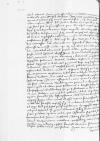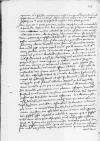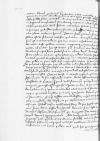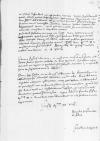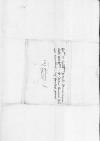⌊⌋ ad te superiore mense Iunio de iis, quae tunc occurrebant atque, ut opinor, satis copiose ad ⌊⌋ tuas, verum cum orig. quum⌈cumcum orig. quum⌉ prospicerem de securo fidoque tabellario, cui ⌊⌋ committerem, perlatus est ad nos sub finem mensis illius nuntius orig. nuncius⌈nuntiusnuntius orig. nuncius⌉ ⌊caesarem⌋ decrevisse adversus ⌊Saxoniae ducem⌋ electorem et ⌊lantgravium Hassiae⌋ pro sua auctoritate orig. autoritate⌈auctoritateauctoritate orig. autoritate⌉ agere atque in eos uti rebelles et malorum omnium auctores orig. autores⌈auctoresauctores orig. autores⌉ concitatoresque animadvertere, quas ad res obeundas cum orig. quum⌈cumcum orig. quum⌉ armis opus esset, magnos equitum peditumque delectus ubique fieri. Quo nuntio orig. nuncio⌈nuntionuntio orig. nuncio⌉ cum orig. quum⌈cumcum orig. quum⌉ nos, qui cf. Stat. Ach. 1.807-808 At tu tranquillus in alta pace mane ⌊in alta pace sederecf. Stat. Ach. 1.807-808 At tu tranquillus in alta pace mane ⌋ credebamus, non parum consternati animo essemus, prospicientibus, quam arduam provinciam ⌊maiestas caesarea⌋ aggrederetur at necessariam tamen, parendumque esset ipsius imperio, varia cuilibet nostrum munia iniuncta fuere. Quae facile effecere, ut ⌊⌋ meas ad te non statuerim tam periculoso tempore, nisi fidis manibus, credere.
Et mihi quidem incubuit cum iis ⌊Hispanorum⌋ atque ⌊Italorum⌋ cohortibus, quae ⌊regi Angliae⌋ durante bello servierant et sub id tempus pace inter ⌊Francos⌋ ⌊Anglos⌋que composita exauctoratae orig. exautoratae⌈exauctorataeexauctoratae orig. exautoratae⌉ per provinciam nostram sese diffuderant, tractare ei written over a⌈aii written over a⌉sdemque provinciam nostram quovis modo exonerare proposita illis spe, si ad ⌊caesarem⌋ contenderent, fore, ut militari stipendio ibi donarentur, nam nobis haudquaquam illorum servitio opus esse neque toleraturos, ut populo nostro diutius sint onerosi. Quibus quidem persuasionibus inducti, praesertim vero accedente liberalitate serenissimae ⌊reginae Mariae⌋, quae de suo proprio, non de ⌊caesaris⌋ aerario, aliquot milia florenorum donativi loco illis elargita est, facile innocui transivere partimque in nostro, partim in Eburonum vicinorum, partim etiam in Iuliacensium agro reliquas copias, quas caesaris nomine illustris dominus ⌊Maximilianus ab Egmonda⌋ comes Burensis parabat, praestolarentur.
At vero iam sub huius conclusionis initium ⌊caesar⌋ praefato orig. prefato⌈praefatopraefato orig. prefato⌉ illustri ⌊comiti Burensi⌋ mandaverat, ut ex nostra vicinaque ⌊Inferioris Germaniae⌋ gente superinscribed⌈gentegente superinscribed⌉ duodecim milia peditum et tria equitum gravis armaturae colligeret. Quibus ut ex ordinario nostro equitatu alas aliquot adiungeremus ceteraque orig. caeteraque⌈ceteraqueceteraque orig. caeteraque⌉ ad profectionem necessaria, imperaverat. Quo factum est, ut ita exigente celeritate nemini nostrum non fuerit satis negotii in promovenda
 UUB, H. 155, f. 140v
⌊illius⌋ abitione, cum orig. quum⌈cumcum orig. quum⌉ nec ipse ullum omitteret momentum ad ea obeunda, quae commissa illi fuere. Itaque intra mensis unius spatium orig. spacium⌈spatiumspatium orig. spacium⌉ equitatus peditatusque omnis paratus fuit.
UUB, H. 155, f. 140v
⌊illius⌋ abitione, cum orig. quum⌈cumcum orig. quum⌉ nec ipse ullum omitteret momentum ad ea obeunda, quae commissa illi fuere. Itaque intra mensis unius spatium orig. spacium⌈spatiumspatium orig. spacium⌉ equitatus peditatusque omnis paratus fuit.
Interea venit in aulam nostram illustris dominus ⌊comes a Buren⌋, cum quo de te longus mihi sermo fuit et suavissimus, cum orig. quum⌈cumcum orig. quum⌉ ille nihil magis optare se dixit, quam ut aliquando tecum adhuc congredi convivereque posset. Addidit et ad te ⌊⌋ sua manu suoque ⌊Marte⌋ compositas, utcumque sonantes Latine et praeseferentes orig. preseferentes⌈praeseferentespraeseferentes orig. preseferentes⌉ non male ab adulescentia institutum hidden by binding⌈[um]um hidden by binding⌉ profecturum fuisse in litteris, nisi diversum vitae genus illum a studiis revocasset. Eas ad te mitto cum praesentibus.
Nec multo post praemisso universo milite, qui ex equitibus ter mille conducticiis orig. conductitiis⌈conducticiisconducticiis orig. conductitiis⌉, nostratibus ordinariis supra mille quadringentis, comprehensis aulicis caesareis aliisque sponte ad eam militiam proficiscentibus, gravioris, inquam, armaturae, levioris autem ⌊Italis⌋ sub hidden by binding⌈[b]b hidden by binding⌉ ⌊Hyppolito Palavicino⌋ ducentis, totidem ⌊Hispanis⌋ et aliquot ⌊Graecis orig. Grecis⌈GraecisGraecis orig. Grecis⌉⌋, ⌊Epyrotis⌋ et ⌊Dalmatis⌋, qui omnes ⌊regi Angliae⌋ servierant hidden by binding⌈[t]t hidden by binding⌉, et ducentis ⌊Germanis⌋ archabusariis, peditibus autem ⌊Germanis Inferioribus⌋ duodecim milibus, Hispanis Italisque, qui et ipsi ex servitio venerant ⌊Anglorum⌋, tribus fere milibus, machinis autem bellicis duodecim cum rebus omnibus necessariis constabat, ⌊ipse⌋ eos prope ⌊Coloniam⌋ assecutus orig. assequutus⌈assecutusassecutus orig. assequutus⌉ non procul a ⌊Rheni⌋ ripa hidden by binding⌈[a]a hidden by binding⌉ iter fecit, nulli nocuit tandemque non procul a ⌊Byngio⌋ flumen hidden by binding⌈[n]n hidden by binding⌉ Rhenum, quod ab altera parte ⌊Fridericus a Reyffenberg⌋ et comes hidden by binding⌈[es]es hidden by binding⌉ ⌊Christophorus ab Oldenborg⌋, is qui infeliciter orig. infoeliciter⌈infeliciterinfeliciter orig. infoeliciter⌉ in ⌊Dania⌋ militavit, cum duodecim aut amplius peditum milibus atque aliquot alis hidden by binding⌈[is]is hidden by binding⌉ equitum servandum sibi desumpserant, illis invitis transmisit coegitque fugam inire omnes ad ipsa moenia ⌊Francophordiae⌋ nonnullis, uti fit, caesis orig. cesis⌈caesiscaesis orig. cesis⌉ captisque signis militaribus aliquot. Receptis ergo locis, quae hostes prius insederant, ex opposito ⌊Moguntiae⌋ reliquus exercitus est per otium orig. ocium⌈otiumotium orig. ocium⌉ traductus ibique ad eum convenere supra quattuor equitum milia, quae caesareum stipendium sub marchionibus ⌊Ioanne⌋ et ⌊Alberto⌋, itemque sub administratore ⌊ordinis Teuthonicorum⌋ merebant, praepeditique orig. prepeditique⌈praepeditiquepraepeditique orig. prepeditique⌉ eatenus, ut ⌊Rhenum hidden by binding⌈[um]um hidden by binding⌉⌋ transire non auderent, ipsius ⌊Burensis⌋ adventum fuerant per aliquot hebdomadas praestolati orig. prestolati⌈praestolatipraestolati orig. prestolati⌉. Quare tam magno auctus
 UUB, H. 155, f. 141r
equitatu[1] et a ⌊c written over ...⌈... illegible⌈...... illegible⌉cc written over ...⌉aesare⌋ accelerare iussus magnis itineribus nullo hoste obviam illi ire audente decima quinta Septembris in castra ⌊caesareae maiestatis⌋ prope ⌊Ingolstadium⌋ magna cum gloria pervenit.
UUB, H. 155, f. 141r
equitatu[1] et a ⌊c written over ...⌈... illegible⌈...... illegible⌉cc written over ...⌉aesare⌋ accelerare iussus magnis itineribus nullo hoste obviam illi ire audente decima quinta Septembris in castra ⌊caesareae maiestatis⌋ prope ⌊Ingolstadium⌋ magna cum gloria pervenit.
Dum haec ea in parte geruntur, accidit ⌊Machliniae⌋ res memorabilis et horrenda. Septima enim die mensis Augusti sub horam undecimam ante mediam written over ridiem⌈ridiemdiamdiam written over ridiem⌉ noctem obortus est timor quidam inter cives nullo certo auctore orig. autore⌈auctoreauctore orig. autore⌉, adeo ut plerique clamarent illum esse extremum diem peterentque confessiones suas audiri et ad monasteria templaque passim concurrerent, cum orig. quum⌈cumcum orig. quum⌉ subito orta sunt gravissima tonitrua fulminaque, adeo ut tenebras noctis fulminis claritas vinceret, nec multo post crepuit ingens turris, quae ad murum urbis erat, quondam porta, a multo autem tempore obstructa, in qua ingens vis pulveris bombardici servabatur, et ita crepuit, ut ab imis fundamentis eversa sit lapidesque eius per totam ⌊urbem⌋ et proximos agros eiecti magnam in ceteris domibus stragem una cum tremore, qui terrae motus videbatur, quem ingens illa pulveris bombardici vis incensa effecit, edidere. Absumpsit ea miserabilis nox supra centum homines, laesit orig. lesit⌈laesitlaesit orig. lesit⌉ et mutilavit ad mille, absumpsit et equos, et animalia domestica quamplura, q(uo)dque[2] magis est, plerasque domos ab ipsis fundamentis, alias extra compagem quasi solutas reddidit, lateres, quibus coopertae erant omnes, a porta, quae in Campiniam ducit, ad templum usque ⌊Divi Rumoldi⌋ per ingentem eam plateam effregit, vitreas fenestras omnes contrivit. In summa nec verbis, nec litteris exprimi possent, quae de infelici orig. infoelici⌈infeliciinfelici orig. infoelici⌉ ea nocte referuntur, et viderentur plerisque fabulosa, quae tamen viri neutiquam vani pro veris asserunt, visa scilicet spectra per urbem, assumptas ex domibus mulieres per aerem in campos latas sine ullo suo impedimento aut nocumento, quosdam cum ipsis lectis ex una domo in aliam asportatos, pisces assos repertos in arboribus, aquam, quae in fossis ⌊urbis⌋ erat, ab ea parte absumptam omnem visaque esse viscera terrae, et quamplura alia, quorum multa violentiae pulveris bombardici possent imputari. In ea enim turre sive porta absumpta sunt mille octingenta vascula portatoria, quorum quodlibet[3]
 UUB, H. 155, f. 141v
centum libras pulveris bombardici electi continebat. Quantum pulveris non puto ab orbe condito in una hora periisse.
UUB, H. 155, f. 141v
centum libras pulveris bombardici electi continebat. Quantum pulveris non puto ab orbe condito in una hora periisse.
Reliquerat hidden by binding⌈[t]t hidden by binding⌉ ⌊caesar⌋ ex bello Gallico reversus ibi eum pulverem volens forte eum in ⌊Hispanias⌋ transmittere servabaturque magna cum industria, sed adversus penetrabile illud fulmen non valuit sollertia orig. solertia⌈sollertiasollertia orig. solertia⌉ humana. Vide hidden by binding⌈[e]e hidden by binding⌉ri principio quibusdam poterat fraudem subesse written over inde⌈indeesseesse written over inde⌉, ut sunt omnia nunc plena malorum hominum. Ceterum facto penitiore scrutinio, compertum est vi fulminis incensum pulverem. Aiunt sane, quod et verissimum est, mulierem viduam, quae eam turrim inhabitavit, cum videret aerem triste quiddam minari magnamque corvorum vim sub noctem ab oriente hoc est itinere, quo ⌊Lovanium⌋ itur, ad ⌊urbem⌋ advolare, sumptis secum pueris suis in aliam domum divertisse, quod se ea nocte in ea turri pernoctare non audere diceret. Idem aliis noctibus, quoties tempestatem sibi ingruere cerneret, facere solitavit hidden by binding⌈[t]t hidden by binding⌉.
Quo quidem in gravi casu, etsi orig. et si⌈etsietsi orig. et si⌉ magna fuit iactura ex tam multa vi pulveris absumpta, quae ad multa milia florenorum ascendit, longe tamen maior superinscribed⌈maiormaior superinscribed⌉ ex subversis aut laceratis domibus fuit, adeo ut, si ⌊Machliniam⌋ perendie, post aliquot dies vidisses, eam sane non cognovisses. Ceterum, ut est in ea ⌊urbe⌋ ingens opulentia, confestim singuli ad sua reficienda intenti brevi effecere, ut pulchrior hidden by binding⌈[r]r hidden by binding⌉ propediem et amaenior orig. amenior⌈amaenioramaenior orig. amenior⌉ quam prius urbs futura sit, quamquam non sine maximis gravissimisque impensis. Inter multa et hoc miraculi loco habitum est, quod cum orig. quum⌈cumcum orig. quum⌉ in nonnullis aliis turribus similiter magna quantitas eiusdem pulveris pro harum ditionum provisione servaretur ignisque easdem circumdedisset, nihil tamen profe hidden by binding⌈[e]e hidden by binding⌉cerit manserintque illae illaesae orig. illesae⌈illaesaeillaesae orig. illesae⌉ eo, qui ⌊caesaris⌋ erat, pulvere in totum absumpto. Habes casum urbis ⌊Machliniae⌋, de quo hostes nostri plurimum fuere laetati passim divulgantes divinam hanc esse iram adversus ⌊caesarem⌋, adversum nos, qui Evangelium (ita vocant suum impium dogma) oppugnaremus. Deo tamen gratia tantum nobis superest huiusmodi pulveris, ut illorum stolidae violentiae facile resistere possimus neque opus nobis sit accelerare ad alterius emptionem, ne uncia quidem eius, quod hac pro regione ser
 UUB, H. 155, f. 142r
vatur, amissa.[4]
UUB, H. 155, f. 142r
vatur, amissa.[4]
Quid interea rerum in ⌊Germania⌋ gestum sit quamque ingente violentia adversarii ⌊maiestatem caesaream⌋, priusquam copias suas in unum contraxisset, aggredi impetereque voluerint, qualiter item angustias montium Tyrolensium,[5] hoc est ⌊Clusam⌋ ad ⌊Riete⌋ et ⌊arcem Ehrenburg⌋, ceperint, reverendissimum ⌊cardinalem Augustensem⌋ ⌊Fuesso written over um(?)⌈um(?)oo written over um(?)⌉⌋, ⌊Tyllinga⌋ pluribusque in ⌊Algowia⌋ castris spoliarint, ⌊oppidum Rheni⌋ ⌊ditionis Bavaricae⌋ dedente domino ⌊Chonrardo a Bommelsberghe⌋, qui et Parvus Hessus dicitur, item ⌊Neuburgum⌋ ad ⌊Danubium⌋ ducis ⌊Othonis Henrici palatini⌋ praesidio munierint aliaque, quae ibidem gesta sunt omnia, quia vobis istic orig. isthic⌈isticistic orig. isthic⌉, quam nobis hic notiora sunt, non commemorabo, rari enim ad nos de iis rebus nuntii orig. nuncii⌈nuntiinuntii orig. nuncii⌉ perveniunt obsessis itineribus per ⌊Wirtembergensem ducatum⌋ omnibus. Tantum scimus ⌊regum Franciae, Angliae⌋ et nescio quorum principum aliorum legatos in utrisque castris versari, utinam bona cum intentione rerum pacandarum. Et si qui ad nos veniunt nuntii orig. nuncii⌈nuntiinuntii orig. nuncii⌉, plerumque nullas habent litteras, ut eo melius fallant in transitu, aut si quae litterae perferuntur, eae per occultos tramites deviaque itinera latae, perbreves sunt. Econtra vero, quae ab adversariis divulgantur parum cum veritate commune habentia, ea quoniam typis excuduntur, passim obtruduntur a vicinis nostris, quibus non omnibus grati sunt optimi ⌊caesaris⌋ conatus iisque modis fit, ut vulgo accrescat audacia in malum et vertiginosus spiritus ad rebellionem.
Sed ne provincia ⌊Frisia⌋ ceteraeque ⌊Transysulanae⌋ adiacentes, quibus illustris ⌊comes a Buren⌋ pro ⌊caesare⌋ praeest orig. preest⌈praeestpraeest orig. preest⌉, eo absente sine capite essent, missus est eo dominus ⌊Wynandus a Breyel⌋ ⌊ordinis militaris Teuthonicorum⌋ commendator, provincialis in ⌊Byesen⌋ prope ⌊Traiectum Mosae⌋, vir in militia ab ineunte aetate versatus, prudens, modestus et fidelis, qui eas provincias adversus conatus hostiles, si qui imminerent, tueretur. Fuere et in vicinis provinciis, qui ⌊illi⌋, si opus essent, succurrerent: illustris ⌊dominus a Prato⌋ in ditione Traiectensi, et
ill(ustris) or ill(ustrissimus)⌈ill(ustris)ill(ustris) or ill(ustrissimus)⌉
dominus ⌊Philippus de Lalaing⌋ comes de ⌊Hoochstrate⌋ in ⌊ducatu Gheldriae⌋ cum aliquot turmis equitum nostratium ordinariorum et cohortibus peditum. Verum quae parari videbatur ab adversariis invasio, illa plane evanuit, ubi provisum illi provinciae, quam sine rectore fore arbitrabantur, intellexere. Porro metus potissimum fuit ab ⌊anababtistis⌋ ceterisque id genus hominibus, qui huius belli occasione apertam sibi fenestram ad malefaciendum
 UUB, H. 155, f. 142v
inter suos iactabant, neque se sine consciis, haud deesse in ⌊Frysia⌋ ⌊Gheldria⌋que non adeo diu pacatis provinciis, quibus praesentia displiceant quique alium malint rerum statum esse. Accedere commercium, quod ipsis sit cum vicinis ⌊Transamasanis⌋, ⌊Tekelenburgensibus⌋ ceterisque hac dudum peste infectis, unde fieri non posse, quominus aliquam huius contagionis partem in se derivarint. Deinde agi de summa rerum, perseveraturi, ne sint in arce rerum viri principes, nobiles, divites, opulenti, an vero eam arcem occupaturi sint ipsi, hoc est egeni, inopes, vagi, desperati. Id enim agi per lantgravium, id agi per confoederatas ipsi urbes, ut exstincta orig. extincta⌈exstinctaexstincta orig. extincta⌉ nobilitate, deleta memoria abbatum, praelatorum orig. prelatorum⌈praelatorumpraelatorum orig. prelatorum⌉, episcoporum, procul pulsis iis, qui ingenio industriaque et fidelitate sibi rem et nomen comparavere, succedant in illorum locum subulci et cerdones, monachi apostatae et sacerdotes impuri, tum foeneratorum et quadruplatorum vilissimi. Nec temere sparsum per ⌊Germaniam⌋ rumorem, habere lantgravium parata quaedam vexilla, quae si quando explicentur, fore, ut ad eum generalis fiat accessio et concursus inferiorum ordinum omnium. Quibus sceleratissimorum hominum conceptibus vanaeque spei, verisimile orig. verisimilae⌈verisimileverisimile orig. verisimilae⌉ est ⌊Ioannem a Lasko⌋, ⌊Davidem Georgii⌋, ⌊Mennonem Symonis⌋, tum(?), ut in ea factione quisque sceleratior est, stimulos addidisse hoc est oleum camino infudisse. Fuere tamen ea hactenus nobis innocua neque quisquam sese commovit. Qualis porro sit exitus rei futurus, in manu Dei est Omnipotentis, nam humano discursu haud quaquam ea assequi possumus.
UUB, H. 155, f. 142v
inter suos iactabant, neque se sine consciis, haud deesse in ⌊Frysia⌋ ⌊Gheldria⌋que non adeo diu pacatis provinciis, quibus praesentia displiceant quique alium malint rerum statum esse. Accedere commercium, quod ipsis sit cum vicinis ⌊Transamasanis⌋, ⌊Tekelenburgensibus⌋ ceterisque hac dudum peste infectis, unde fieri non posse, quominus aliquam huius contagionis partem in se derivarint. Deinde agi de summa rerum, perseveraturi, ne sint in arce rerum viri principes, nobiles, divites, opulenti, an vero eam arcem occupaturi sint ipsi, hoc est egeni, inopes, vagi, desperati. Id enim agi per lantgravium, id agi per confoederatas ipsi urbes, ut exstincta orig. extincta⌈exstinctaexstincta orig. extincta⌉ nobilitate, deleta memoria abbatum, praelatorum orig. prelatorum⌈praelatorumpraelatorum orig. prelatorum⌉, episcoporum, procul pulsis iis, qui ingenio industriaque et fidelitate sibi rem et nomen comparavere, succedant in illorum locum subulci et cerdones, monachi apostatae et sacerdotes impuri, tum foeneratorum et quadruplatorum vilissimi. Nec temere sparsum per ⌊Germaniam⌋ rumorem, habere lantgravium parata quaedam vexilla, quae si quando explicentur, fore, ut ad eum generalis fiat accessio et concursus inferiorum ordinum omnium. Quibus sceleratissimorum hominum conceptibus vanaeque spei, verisimile orig. verisimilae⌈verisimileverisimile orig. verisimilae⌉ est ⌊Ioannem a Lasko⌋, ⌊Davidem Georgii⌋, ⌊Mennonem Symonis⌋, tum(?), ut in ea factione quisque sceleratior est, stimulos addidisse hoc est oleum camino infudisse. Fuere tamen ea hactenus nobis innocua neque quisquam sese commovit. Qualis porro sit exitus rei futurus, in manu Dei est Omnipotentis, nam humano discursu haud quaquam ea assequi possumus.
Et haec quidem de publicis. Enimvero privatis rebus meis magno fuit incommodo mors ⌊generi⌋ mei, hoc est mariti ⌊Katharinae⌋ filiae ⌊uxoris⌋ meae. ⌊Ille⌋ enim praeterquam orig. preterquam⌈praeterquampraeterquam orig. preterquam⌉ quod in flore aetatis obiens relicta unica tantum prole magnum sui desiderium orig. desyderium⌈desideriumdesiderium orig. desyderium⌉ consorti reliquit, nobis etiam hoc addidit oneris, quod ⌊uxorem⌋ sobolemque suam curae nostrae quasi iterum reddiderit. Sed ferenda haec sunt omnia. Fuit certe praep<r>opera orig. prep<r>opera⌈praep<r>operapraep<r>opera orig. prep<r>opera⌉ illius mors, multis luctuosa, quibus in eo plurimum erat hidden by binding⌈[t]t hidden by binding⌉ praesidii orig. presidii⌈praesidiipraesidii orig. presidii⌉, praesertim orig. presertim⌈praesertimpraesertim orig. presertim⌉ vero ⌊Veriensibus⌋ in ⌊Zelandia⌋, apud quos maiores ipsius atque ipse cumprimis semper fuere gratiosi, utpote a quibus
 UUB, H. 155, f. 143r
in rebus difficilibus[6] non ipsi tantum, verum maior Insulanorum pars adiuti, protecti defensique fuere. Nec minus ⌊illius⌋ morte doluit illustris ⌊dominus a Beveris⌋, ut qui in illius humeros sarcinam rerum suarum omnium iniecisset. Tantum erat in ⌊iuvene⌋ ingenii et dexteritatis tantum. Utinam privata ea sola sit mea et meorum calamitas, eamque Deus a republica avertat.
UUB, H. 155, f. 143r
in rebus difficilibus[6] non ipsi tantum, verum maior Insulanorum pars adiuti, protecti defensique fuere. Nec minus ⌊illius⌋ morte doluit illustris ⌊dominus a Beveris⌋, ut qui in illius humeros sarcinam rerum suarum omnium iniecisset. Tantum erat in ⌊iuvene⌋ ingenii et dexteritatis tantum. Utinam privata ea sola sit mea et meorum calamitas, eamque Deus a republica avertat.
Quod aliud scribendum occurrat, non adest, nam haeremus orig. heremus⌈haeremushaeremus orig. heremus⌉ omnes exspectatione exitus huius belli, cuius pars non dubito, quin et vos istic orig. isthic⌈isticistic orig. isthic⌉ continget. Utcumque res cadent, nulla nos publica privatave calamitas ab invicem separabit animis.
Dominus Deus Reverendissimam Dominationem Vestram conservet cum suis omnibus.
 UUB, H. 155, f. 140v
UUB, H. 155, f. 140v
 UUB, H. 155, f. 141r
equitatu[1] et a
UUB, H. 155, f. 141r
equitatu[1] et a  UUB, H. 155, f. 141v
centum libras pulveris bombardici electi continebat. Quantum pulveris non puto ab orbe condito in una hora periisse.
UUB, H. 155, f. 141v
centum libras pulveris bombardici electi continebat. Quantum pulveris non puto ab orbe condito in una hora periisse.
 UUB, H. 155, f. 142r
vatur, amissa.[4]
UUB, H. 155, f. 142r
vatur, amissa.[4]
 UUB, H. 155, f. 142v
inter suos iactabant, neque se sine consciis, haud deesse in
UUB, H. 155, f. 142v
inter suos iactabant, neque se sine consciis, haud deesse in  UUB, H. 155, f. 143r
in rebus difficilibus[6] non ipsi tantum, verum maior Insulanorum pars adiuti, protecti defensique fuere. Nec minus
UUB, H. 155, f. 143r
in rebus difficilibus[6] non ipsi tantum, verum maior Insulanorum pars adiuti, protecti defensique fuere. Nec minus 
